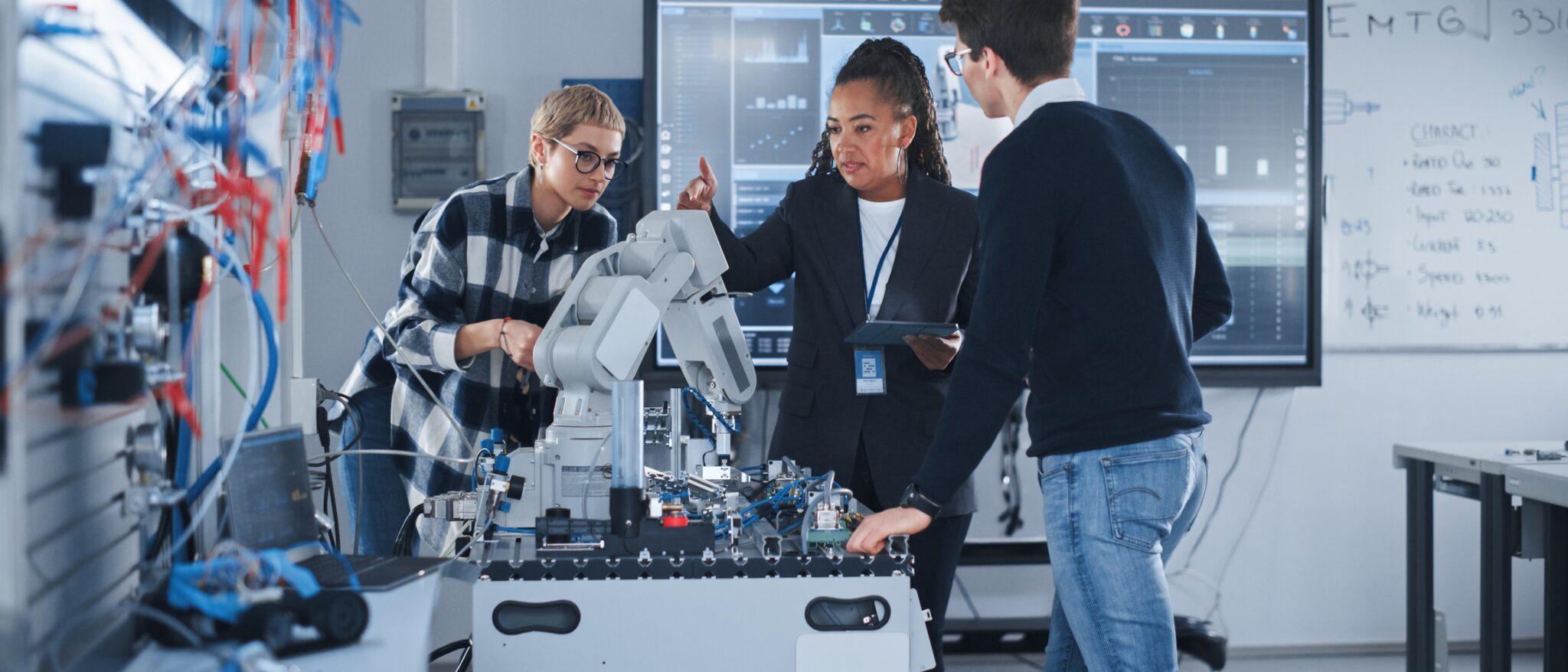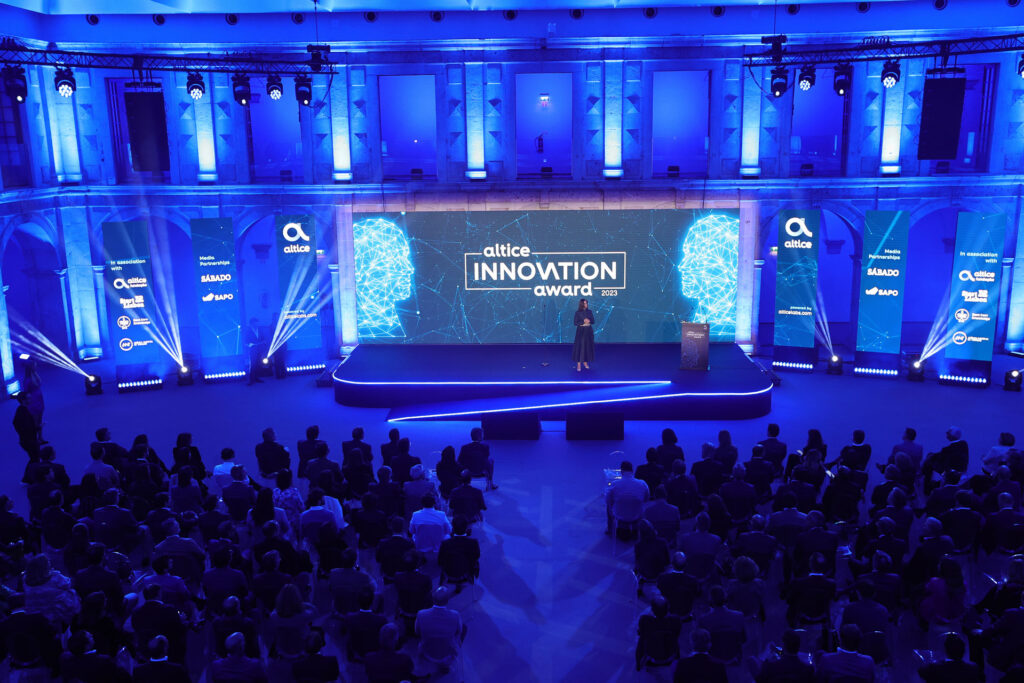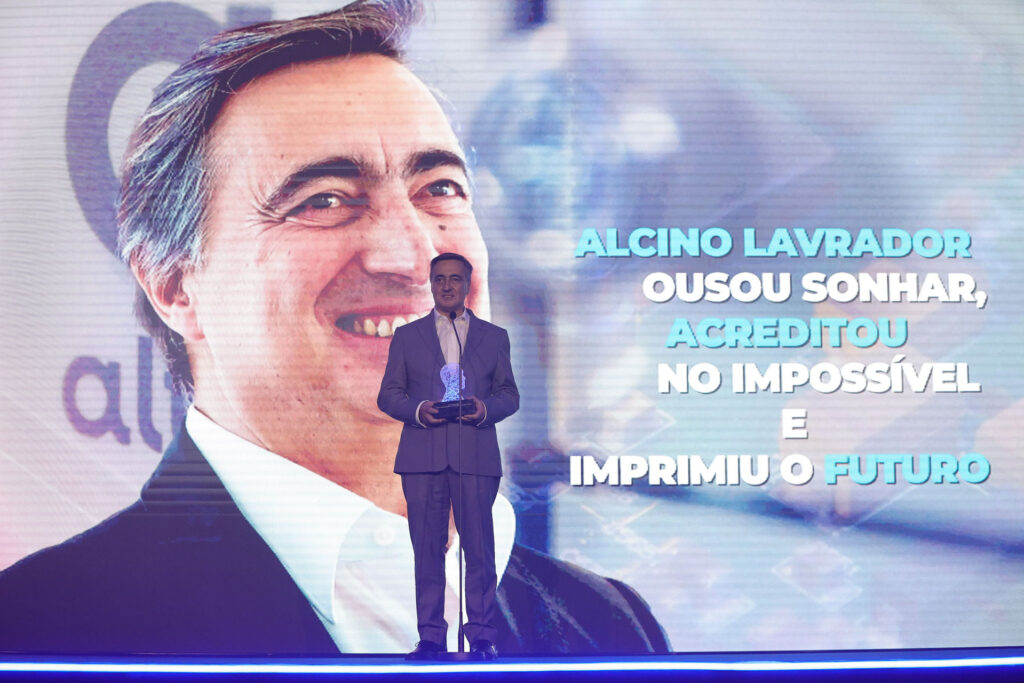116 projects were submitted to the 7th edition of the Altice International Innovation Award (AIIA), promoted by Altice since 2017. In the six years since the Awards began, Altice has evaluated 616 submissions and selected projects whose capacity for innovation makes them stand out, and which also demonstrate technical expertise and an entrepreneurial business model.
Nine projects have now been shortlisted for this edition, and on 21st November, the finalists will have their last chance to make their final pitch to the jury panel comprising various well-known figures in the sector (see box) and presided over by the CEO of Altice Portugal, Ana Figueiredo. The three winners will also be announced on the night, one for each category: Academy, Startup and Inclui. “The Altice International Innovation Award is one of the largest in the field of technology, which aims to highlight, promote and support technological talent while reinforcing Altice’s role as an innovative group”.
The AIIA is geared towards final-year PhD students and start-ups in their incubation phase, and aims to reward innovative projects in technological fields relevant to Altice’s core business, such as Artificial Intelligence /Machine Learning, Augmented Reality, 5G, the Internet of Things, Smart Cities, Smart Living, Big Data, eHealth, Digital Content, Future Networks, Over the Top Services, Security, Blockchain and Quantum Technologies, among other things. The 7th edition of these Awards will also reward digital inclusion and accessibility via its “Inclui” category, promoted by the Altice Foundation. Over the last five years, Altice Portugal has invested 361 million euros in R&D and registered 17 international patents. The company’s goal it to get to 100 patents by 2030, and to achieve this it will need the talent and partnerships which also arise from this competition.
“The Altice International Innovation Award is one of the largest in the field of technology, which aims to highlight, promote and support technological talent”
€95,000 will be up for grabs in this 7th edition, divided among the three categories. The cash prize in the Startup category is €50,000 and the winner will get the chance to perform a proof of concept with Altice, as well as access the incubation services offered by Startup Lisboa. The prize money in the Academy category is €25,000, and the Altice Foundation’s Inclui category will award a sum of €20,000.
The nine finalists will also automatically qualify for the Born from Knowledge (BfK) Award given by the National Innovation Agency (ANI), which will be joining forces with the AIIA for the seventh year running to select the best “knowledge-born” project resulting from research and development (R&D) work. The cash prize for the winning project is €2,500, along with the Tree of Knowledge, a work of art symbolizing the enhancement of national scientific and technological knowledge.
One of the new developments in this edition is the partnership between Altice Portugal and Start-up Lisboa, to support candidate start-ups whose projects are in their incubation phase, with a view to raising capital
The members of the AIIA jury are
- Ana Figueiredo, CEO, Altice Portugal (Chair of the jury panel)
- Alcino Lavrador, Technology and Innovation Consultant
- Anabela Pedroso, Corporate Adviser, CEiiA
- Diogo Araújo, Director of Capacity Building of the National Innovation System, ANI
- Gil Azevedo, Executive Director, Startup Lisboa
- Luís Santana, CEO, Cofina Media
- Miguel Castro Neto, Dean, Nova IMS
- Paulo Firmeza, Director-General of Altice Labs
- Pedro Santa Clara, Director, TUMO-Coimbra and Escola 42
- Teresa Salema, Altice Foundation
Academic projects
Charging the future of Evs through the Wheel
Emanual Marques has developed a project, ‘Charging the future of Evs through the Wheel’, which aims to design and optimise a new solution where the car’s steering wheel has a wireless battery charging capability. This means that the energy transfer capability is independent of the distance between the base of the car and the ground, which has been a limitation of conventional IPT solutions (technical solutions for electric vehicle charging systems).
By submitting his project to the AIIA, the University of Coimbra PhD student hopes to have “the chance to show the work I have done to be assessed by a panel of people with different skills, who can give me some tips and, if possible, help to outline my next steps.” Emanuel further wanted to demonstrate that the research group at the University of Coimbra and the Telecommunications Institute, where he developed his thesis, is focused on real world problems with applications in the areas of Power Electronics and Electrical Machines, “as already demonstrated by different projects financed by the FCT and by the creation of various start-ups.” The next step is to ensure intellectual property by registering a patent and, in tandem with this, continuing to work on a prototype for certification and to demonstrate its applications to potential investors in the automotive field.
Human-Centered Design of Personalized Intelligent Agents in Medical Imaging Diagnosis – BreastScreening-AI
BreastScreening-AI is a pioneering platform designed to revolutionise breast cancer diagnosis using advanced artificial intelligence, with the aim of democratising access to high-quality diagnostics. By integrating specialist intelligent agents, this system addresses the two critical challenges facing modern medicine: the scarcity of selected medical data and the need for transparent AI decision-making. By providing clear and interpretable explanations for each diagnosis and emphasising evidence-based medicine, BreastScreening-AI not only improves diagnostic accuracy but also promotes confidence between doctors and AI, thereby ensuring that healthcare professionals remain in control of patient care decisions.
Francisco Calisto, the project promotor, highlights the “challenging journey, particularly in ensuring that the recommendations resulting from the artificial intelligence models were able to be interpreted by clinicians and trusted.” He explains that integrating the system in the existing medical workflows without causing disruptions required “a profound understanding of the clinical environment and an approach that applied a human-centred design technique”, on which he is currently giving lectures at the Instituto Superior Técnico as a guest assistant professor.
There are solutions for electric cars, for breast cancer diagnosis and to improve healthcare systems
Methods for Improving Generalizability and Robustness of Medical Imaging AI Models
The broad goals of this project developed by João Santinha are to improve healthcare through more effective diagnoses, enhanced by artificial intelligence, and improve the efficiency of healthcare systems. “Developing solutions to create sturdier models is crucial,” he says.
“These methods are extremely important since current artificial intelligence models can’t guarantee the capability to deal with the variations that occur in health systems and don’t guarantee the security required for employing AI to help clinicians in screening, diagnosing and assessing response to treatment in patients using imaging.”
The next step will be to make these methods available as open source, thereby lowering the chances that the benefits provided by these methods are only accessible to a small section of the population.
João Santinha also wishes to utilise these methods in creating two medical devices under development at the Champalimaud Foundation’s Digital Surgery LAB, which “will revolutionise breast cancer surgery.”












